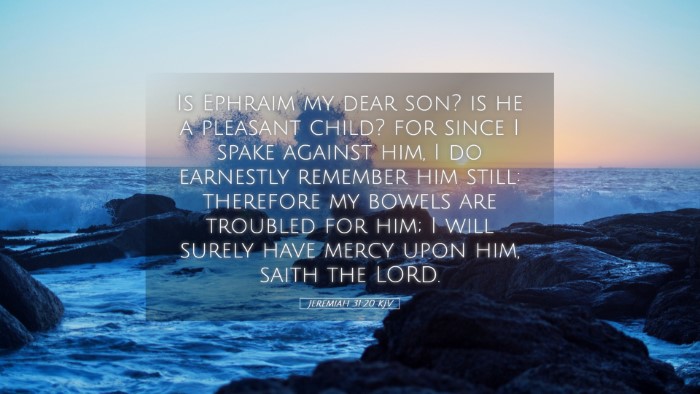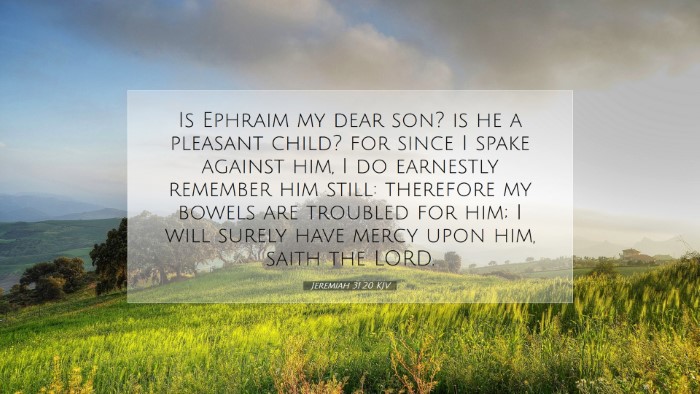Commentary on Jeremiah 31:20
Verse: "Is Ephraim my dear son? is he a pleasant child? for since I spake against him, I do earnestly remember him still: therefore my bowels are troubled for him; I will surely have mercy upon him, saith the LORD."
Introduction
The verse Jeremiah 31:20 is a poignant expression of God’s deep affection for His people, particularly Ephraim, which represents the northern kingdom of Israel. This passage encapsulates themes of parental love, divine compassion, and the promise of restoration. The emotional depth found in this verse resonates with various theological insights, emphasizing God's steadfast love and mercy.
Contextual Background
To appreciate the weight of Jeremiah 31:20, we must consider its context. Jeremiah prophesied during a dark time for Israel, foreseeing the Babylonian captivity and the eventual desolation of Jerusalem. The surrounding chapters detail the grief of God over His people’s waywardness, juxtaposed with His unwavering commitment to restore them. This verse serves as a comforting reminder of that divine commitment.
Theological Insights
- Ephraim's Identity: Ephraim symbolizes not only a tribe but also the entirety of Israel. Albert Barnes notes that Ephraim, once prosperous and favored, serves as a representative of Israel’s spiritual and moral decline. God's reference to Ephraim as 'My dear son' emphasizes His paternal relationship with Israel and the depth of His love.
- Divine Compassion: Matthew Henry points out the emotional turmoil within God as He grapples with His people's rebellion. The phrase "my bowels are troubled" illustrates God's deep-seated concern and arousal of mercy for His children. This language signifies more than mere affection; it underscores a visceral, heartfelt response to the plight of His people.
- God's Remembrance: The verse highlights God’s remembrance of His people. Adam Clarke elucidates that though the people may wander away from Him, God has not forgotten them. His ability to 'earnestly remember' indicates an active engagement with His creation, emphasizing that despite Israel’s failures, God’s plans for them remain intact.
- Assurance of Mercy: The conclusion of the verse, "I will surely have mercy upon him," reflects God's promise of restoration and forgiveness. This divine declaration serves as a beacon of hope amidst despair. Henry remarks that God's mercy is not merely a notion but a tangible promise that extends beyond punishment to redemption.
Pastoral Applications
For pastors, Jeremiah 31:20 provides a powerful sermon foundation on God's grace and mercy. This passage can be used to illustrate God’s loving nature towards His people, reinforcing the hope of restoration and reconciliation. When addressing congregations dealing with sin or disillusionment, the message of God’s compassionate heart can offer encouragement and reassurance.
Academic Reflection
The verse presents critical themes for theological study, particularly regarding the nature of divine love and justice. Scholars may explore the implications of God's emotional investment in humanity and how this reflects on our understanding of divine attributes. The interplay between judgment and mercy in Jeremiah invites deeper inquiry into the nature of covenant relationships as portrayed in the Hebrew Scriptures.
Conclusion
Jeremiah 31:20 stands as a testimony to God's unwavering commitment to His people, showcasing His dual nature of justice and mercy. It challenges readers to reflect on their relationship with God and the depth of His love for humanity. In light of this verse, believers are called to embrace the hope of redemption, assured that God not only remembers them but longs to restore them to Himself.


